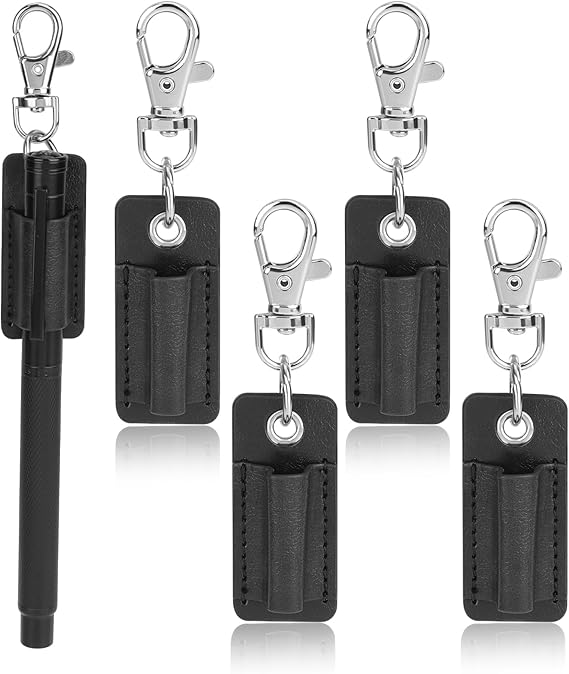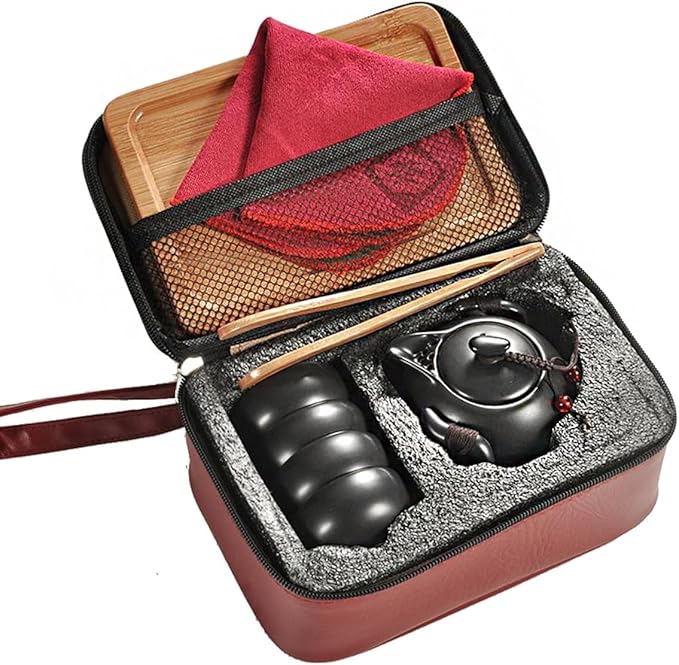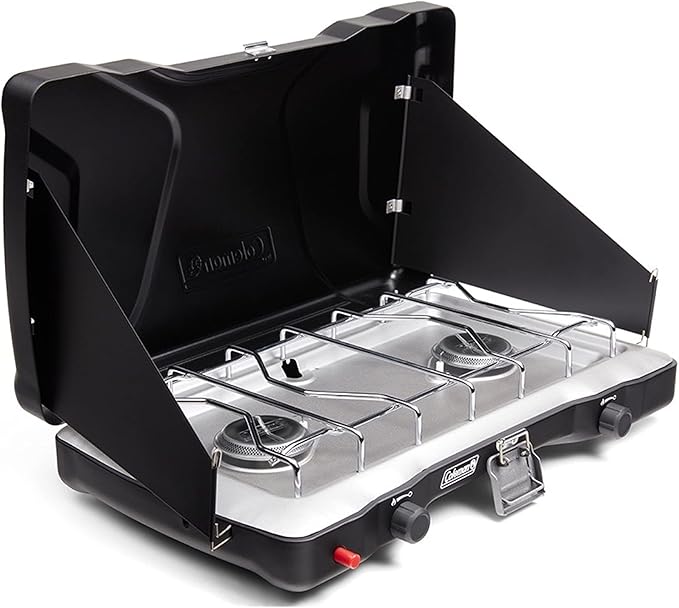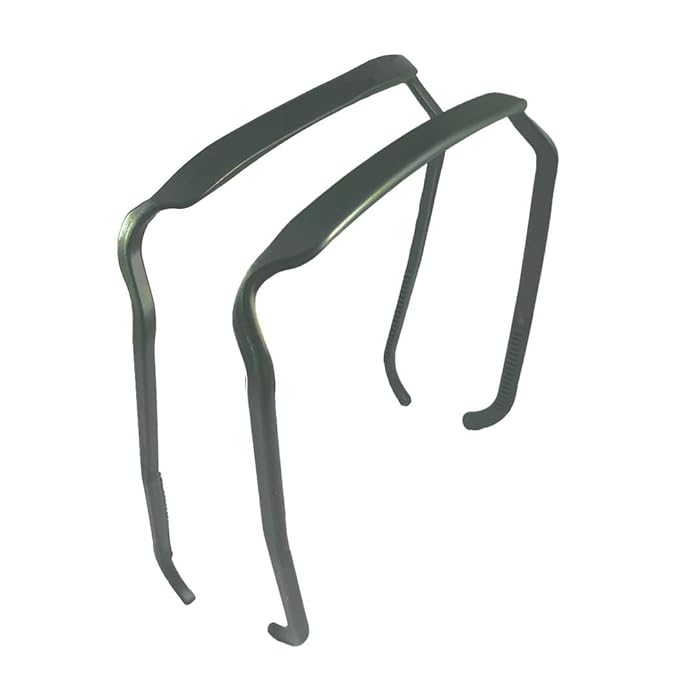There are so-called concrete nouns and abstract nouns in Italian:
1. Concrete nouns
Concrete nouns refer to entities that can be perceived by our five senses: touch, sight, hearing, smell, and taste.
Ex: cane (dog), tavolo (table), meal (apple), uccello (bird), profumo (perfume).
2. Abstract nouns
Abstract nouns refer to entities that cannot be perceived by our five senses: touch, sight, hearing, smell, and taste.
Ex: ottimismo (optimism), educazione (education), paura (fear), guerra(war).
3.Typs of abstract noun
Abstract nouns represent an idea, an aspect, a concept, a sensation, an emotion, a state of mind, an experience, or a quality.
1. Abstract nouns for feelings: disgusto (disgust), eccitazione (excitement), indifferenza (indifference), gioia (joy), solitudine (loneliness).
2. Abstract nouns for states of mind: confusione (confusion), paura (fear), dolore (pain).
3. Abstract nouns for personality traits: determinazione (determination), ottimismo (optimism), saggezza (wisdom), empatia (empathy), coraggio (courage).
4. Abstract nouns for ideas & concepts: sensibilità (sensitivity), educazione (education), democrazia (democracy), credenza (belief), relazione (relationship).
5. Abstract nouns for events & experiences: futuro (future), anniversario (anniversary), promozione (promotion), guerra (war), infanzia (childhood).
4. Abstract noun suffixes
Most abstract nouns end with -tà, -anza, -enza, -ezza, -ione, -izia, -igia, -ura:
- –ità, –età, –tà: felicità, varietà, fedeltà
- –ezza, –izia: saggezza, altezza, giustizia
- – ore, –ura: stupore, bravura
- – itudine: solitudine
- –eria: tirchieria
Amazon Ads
Here is a list of abstract nouns with their meaning and examples:
- I Nomi Astratti (The Abstract Nouns)
- La Lealtà / La Fedeltà / L’onestà / La Sincerità (The Loyalty / The Fidelity / The Honesty / The Sincerity)
- La Slealtà / L’infedeltà / La Disonestà / L’insincerità (The Disloyalty / The Infidelity / The Dishonesty / The Insincerity)
- La Generosità (The Generosity)
- La Tirchieria / L’avarizia (The Stinginess / The Avarice)
- La Libertà (The Freedom)
- La Servitú / La Cattività (The Servitude / The Captivity)
- Il Rispetto / L’apprezzamento (Il Respect / The appreciation)
- Il Disprezzo (The Contempt)
- La Speranza (The Hope)
- La Disperazione (The Despair)
- La Realtà (The Reality)
- La Fantasia / L’illusione (The Fantasy / The Illusion)
- La Rabbia (The Anger)
- La Calma (The Calm)
- L’approvazione (The Approval)
- La Disapprovazione (The Disapproval)
- L’affermazione / L’accettazione (The Affirmation / The acceptance)
- La Negazione (The Denial)
- La Solitudine (The Solitude)
- La Compagnia (The Company)
1. I Nomi Astratti | The Abstract Nouns
Noun masculine singular (Il nome) plural (I nomi)
Adjective Masculine Singular (Astratto) Plural (Astratti) Feminine Singular (Astratta) Plural (Astratte)
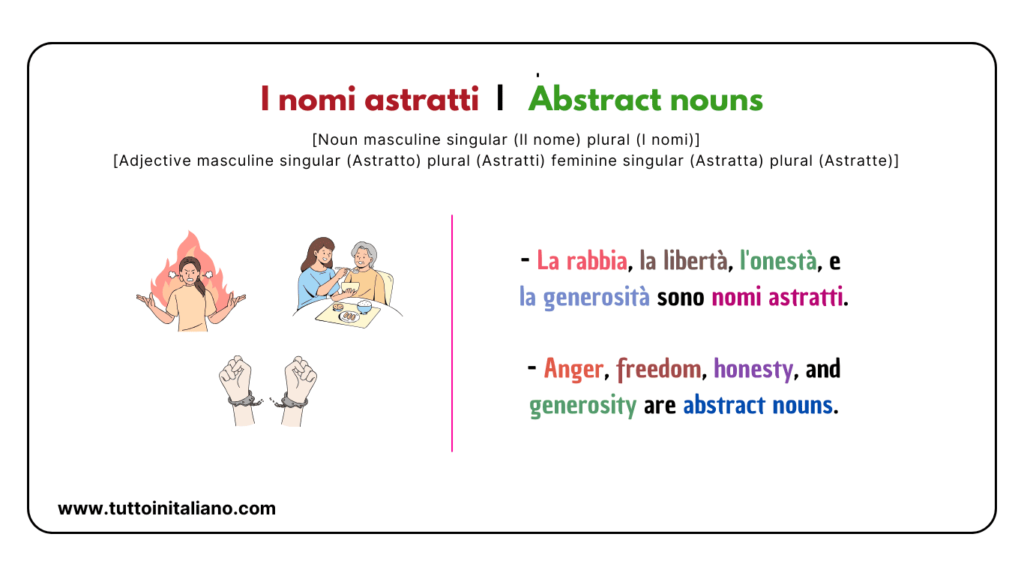
- I nomi astratti non possono essere percepite dai nostri cinque sensi.
- Abstract nouns cannot be perceived by our five senses.
- La rabbia, la libertà, l’onestà, e la generosità sono nomi astratti.
- Anger, freedom, honesty, and generosity are abstract nouns.
2. La Lealtà / La Fedeltà / L’onestà / La Sincerità | The Loyalty / The Fidelity / The Honesty / The Sincerity
Noun Feminine singular (La lealtà/Fedeltà/sincerità/L’onestà) plural (Le lealtà/fedeltà/sincerità/onestà)
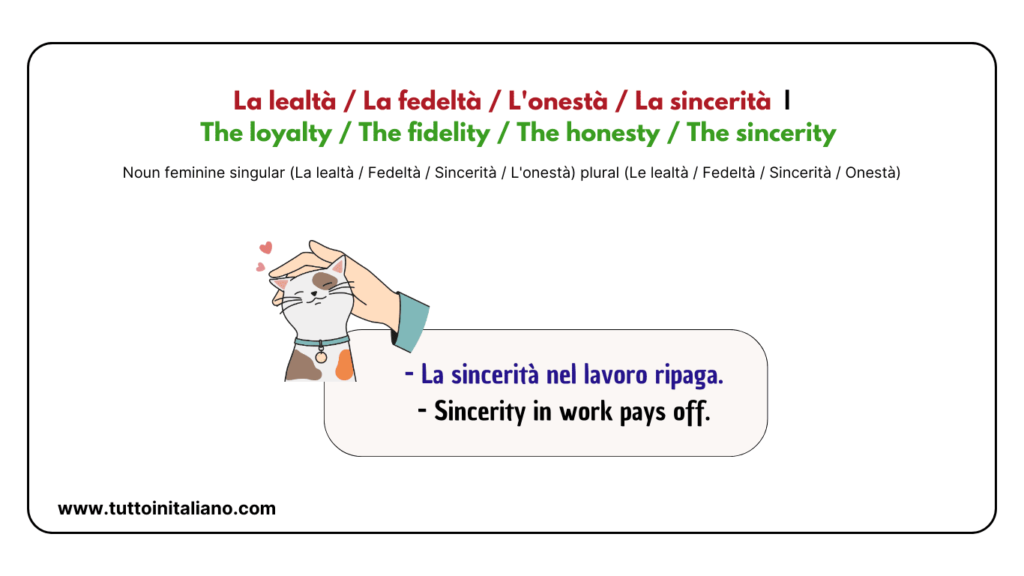
- La sincerità nel lavoro ripaga.
- Sincerity in work pays off.
- Non ho alcuna lealtà verso questo regime ingiusto.
- I have no loyalty to this unjust regime.
- Le persone oneste dimostrano sempre sincerità.
- Honest people always show sincerity.
- L’amore e la fedeltà sono il fondamento di relazioni di successo.
- Love and fidelity are the foundation of successful relationships.
3. La Slealtà / L‘infedeltà / La Disonestà / L’insincerità | The Disloyalty / The Infidelity / The Dishonesty / The Insincerity
Noun Feminine singular (La slealtà/disonestà/L’insincerità/infedeltà) plural (Le slealtà/disonestà/insincerità/infedeltà)
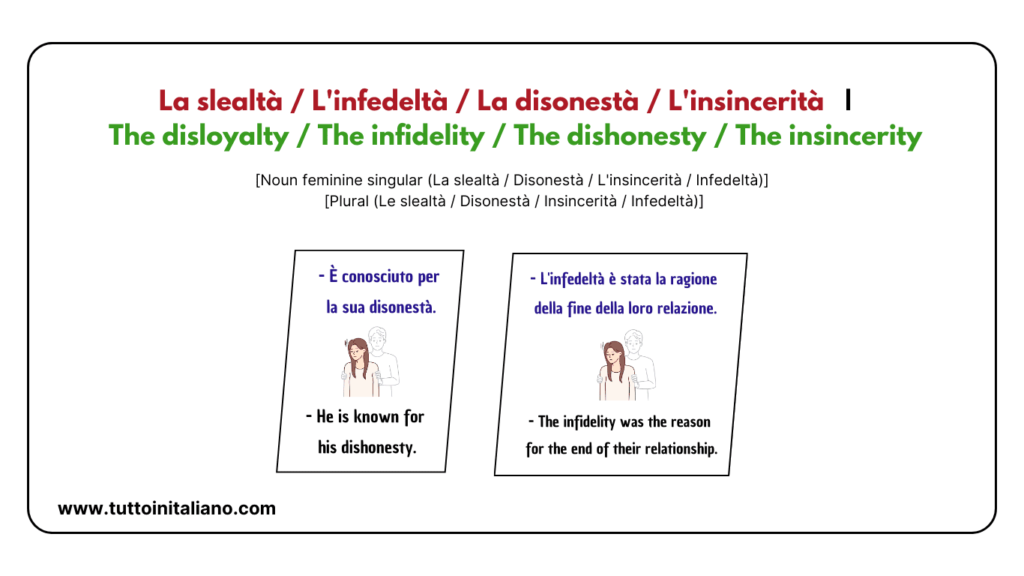
- L’infedeltà è stata la ragione della fine della loro relazione.
- The infidelity was the reason for the end of their relationship.
- È conosciuto per la sua disonestà.
- He is known for his dishonesty.
4. La Generosità | The Generosity
Noun Feminine singular (La Generosità) plural (Le Generosità)
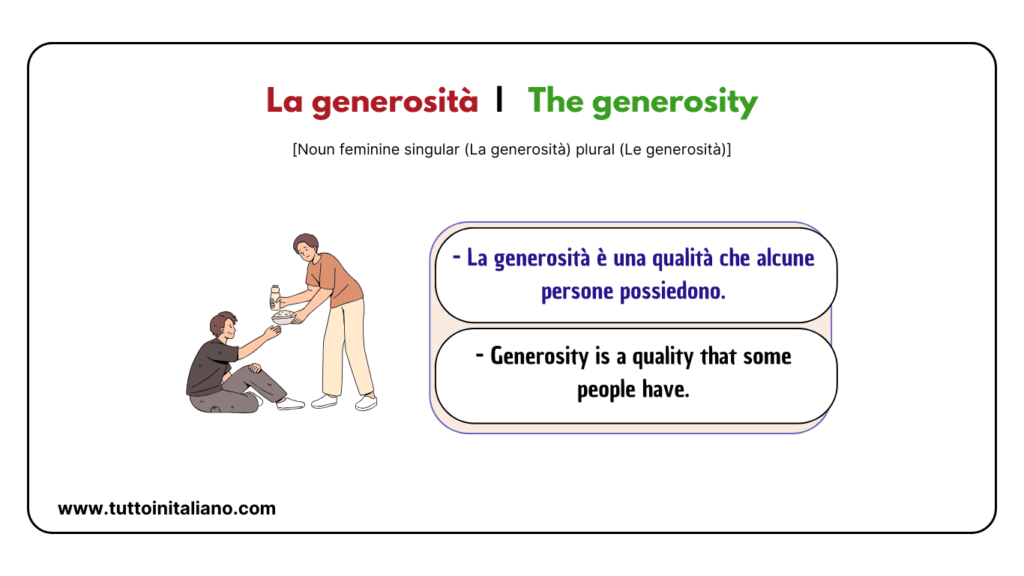
- La generosità è una qualità che alcune persone possiedono.
- Generosity is a quality that some people have.
- L’eccessiva generosità porta ad un’eccessiva avidità da parte degli altri.
- Excessive generosity leads to excessive greed from others.
5. La Tirchieria / L’avarizia | The Stinginess / The Avarice
Noun Feminine singular (La Tirchieria / L’avarizia) plural (Le Tirchierie / Le avarizie)
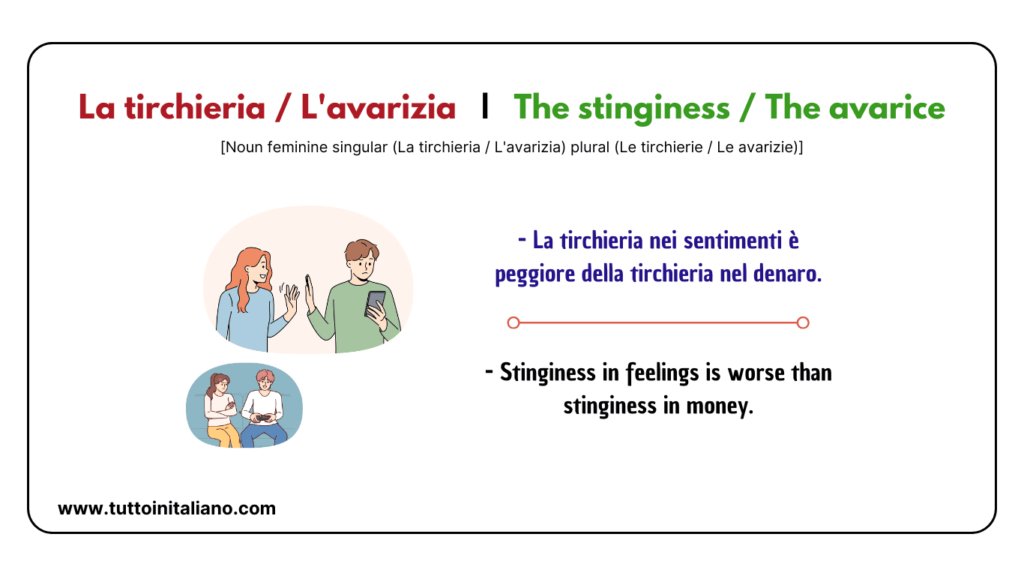
- Orgoglio, invidia e avarizia sono le sue caratteristiche.
- Pride, envy, and greed are his characteristics.
- La tirchieria nei sentimenti è peggiore della tirchieria nel denaro.
- Stinginess in feelings is worse than stinginess in money.
Amazon Ads
6. La Libertà | The Freedom
Noun Feminine singular (La Libertà) plural (Le Libertà)
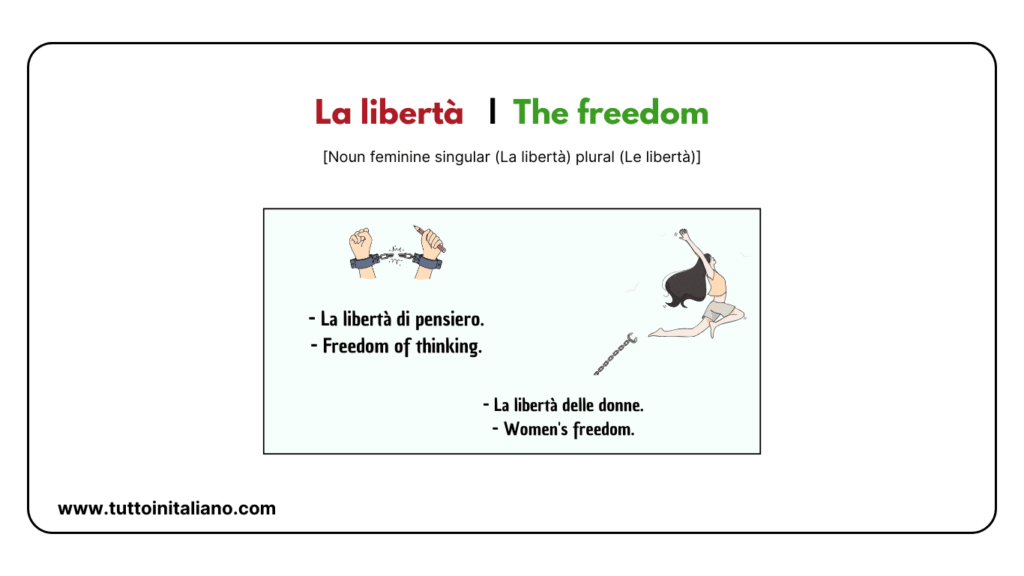
- La libertà non ha prezzo.
- freedom is priceless.
- La libertà non è gratuita.
- freedom is not free.
- La libertà di pensiero.
- Freedom of thinking.
- La libertà delle donne.
- Women’s freedom.
7. La Servitú / La Cattività | The Servitude / The Captivity
Noun Feminine singular (La Servitú/Cattività) plural (Le Servitú/Cattività)
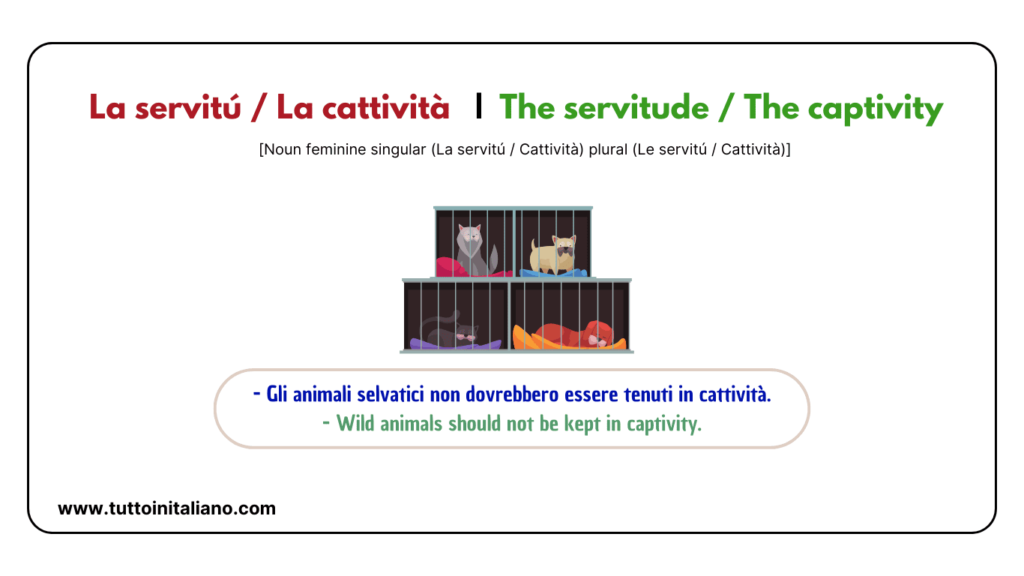
- La schiavitù non è ancora finita.
- Slavery is not over yet.
- La schiavitù è ancora praticata su popoli e paesi.
- Slavery is still practiced on peoples and countries.
- Gli animali selvatici non dovrebbero essere tenuti in cattività.
- Wild animals should not be kept in captivity.
8. Il Rispetto / L’apprezzamento | Il Respect / The appreciation
Noun masculine singular (Il Rispetto) plural (I Rispetti)
Noun masculine singular (L’apprezzamento) plural (Gli apprezzamenti)
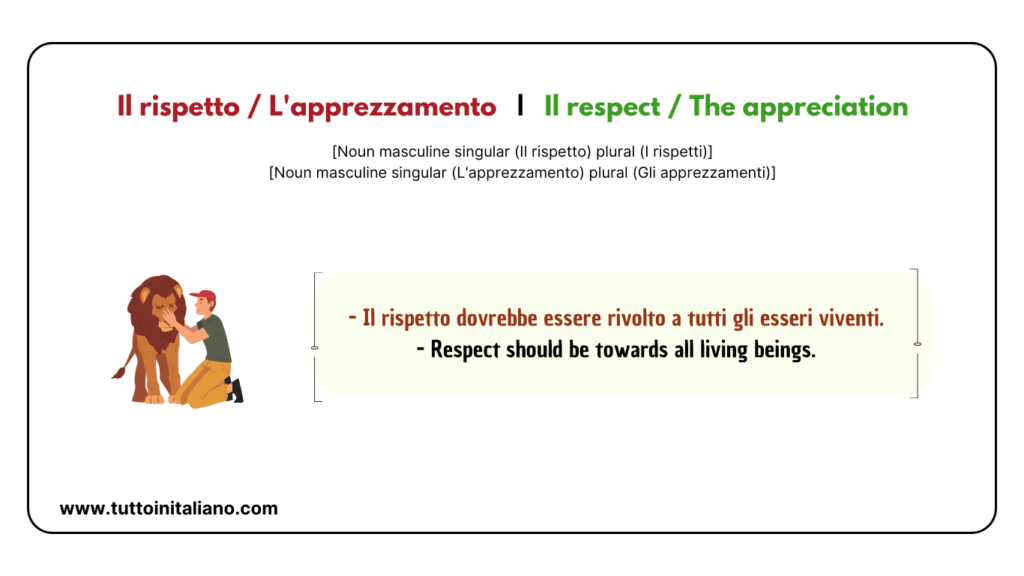
- Il rispetto non è limitato a un gruppo specifico di individui.
- Respect is not limited to a certain category of individuals.
- Il rispetto dovrebbe essere rivolto a tutti gli esseri viventi.
- Respect should be towards all living beings.
- Ha ricevuto il Premio di Apprezzamento dallo Stato.
- Received the State Appreciation Award.
- Ha avuto l’apprezzamento che meritava.
- He got the appreciation he deserved.
9. Il Disprezzo | The Contempt
Noun masculine singular (Il Disprezzo) plural (I Disprezzi)
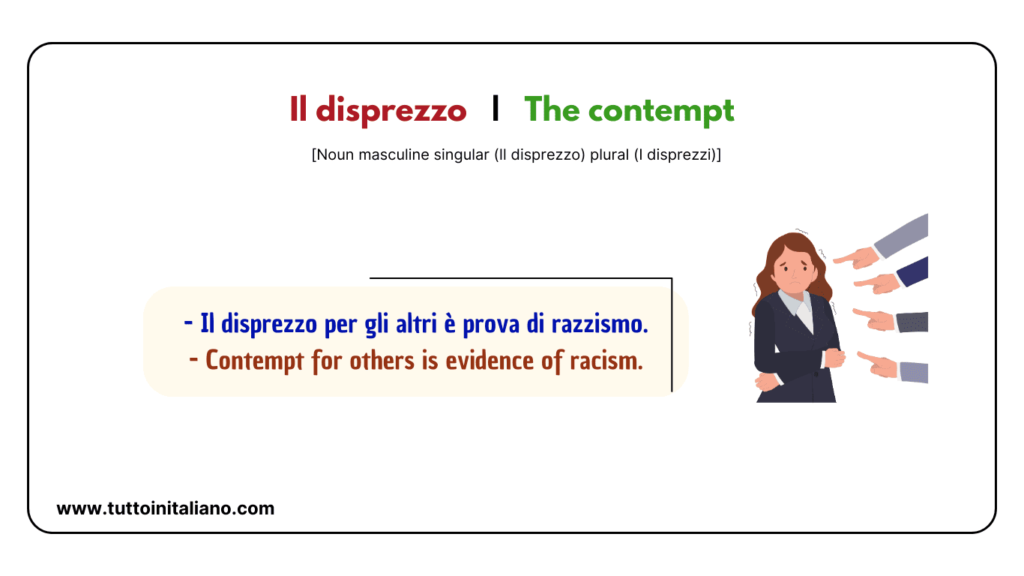
- Il disprezzo per gli altri è prova di razzismo.
- Contempt for others is evidence of racism.
- Disprezzo delle religioni.
- Contempt for religions.
10. La Speranza | The Hope
Noun Feminine singular (La Speranza) plural (Le Speranze)
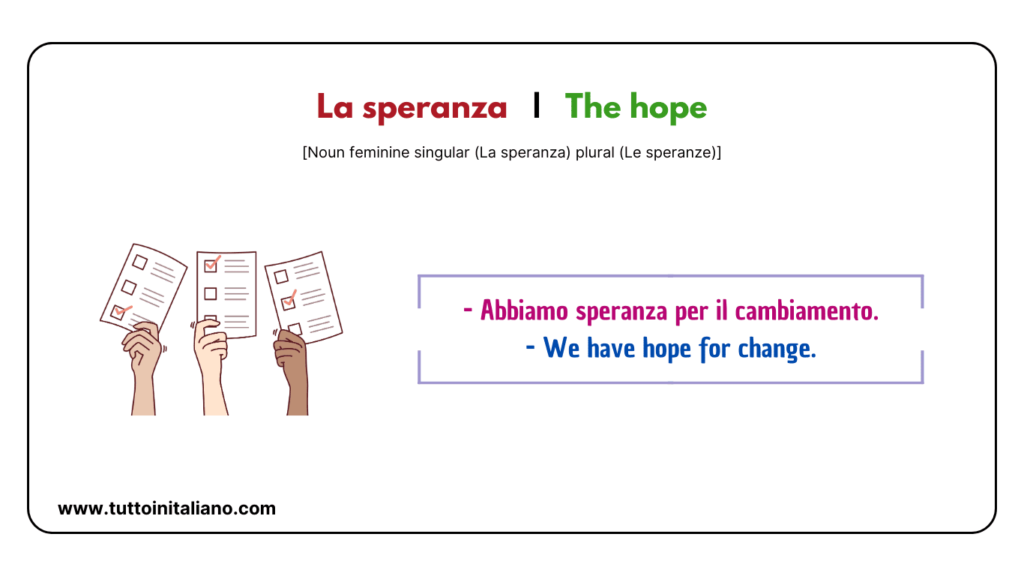
- La speranza deve rimanere tra noi affinché possiamo essere liberi.
- Hope must remain among us so that we can be free.
- Abbiamo la speranza di vincere la guerra per ottenere la libertà.
- We hope to win the war for freedom.
- Abbiamo speranza per il cambiamento.
- We have hope for change.
Amazon Ads
11. La Disperazione | The Despair
Noun Feminine singular (La Disperazione) plural (Le Disperazioni)
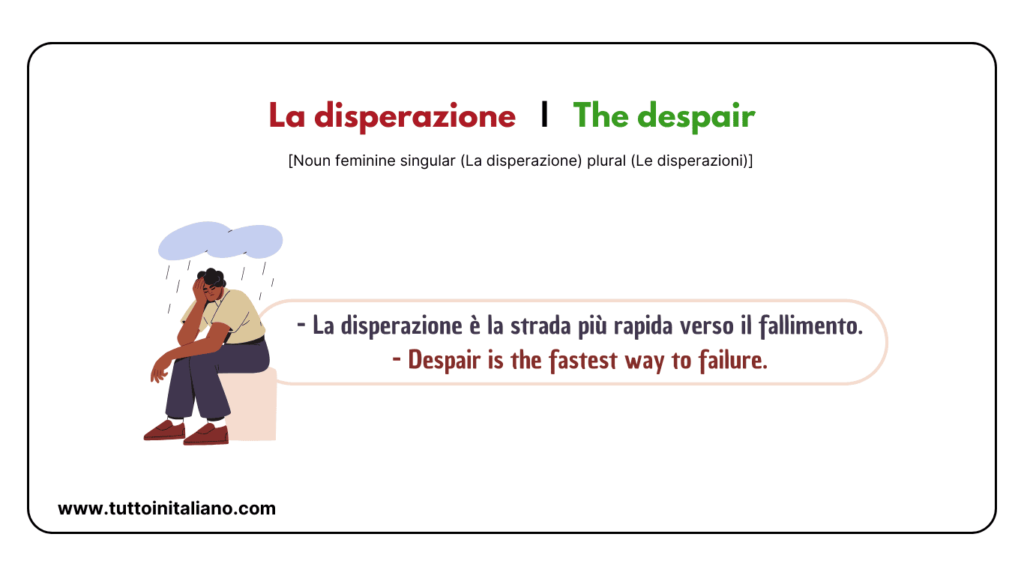
- Non c’è disperazione con la vita e non c’è vita con la disperazione.
- There is no despair with life and no life with despair.
- La disperazione è la strada più rapida verso il fallimento.
- Despair is the fastest way to failure.
12. La Realtà | The Reality
Noun Feminine singular (La Realtà) plural (Le Realtà)
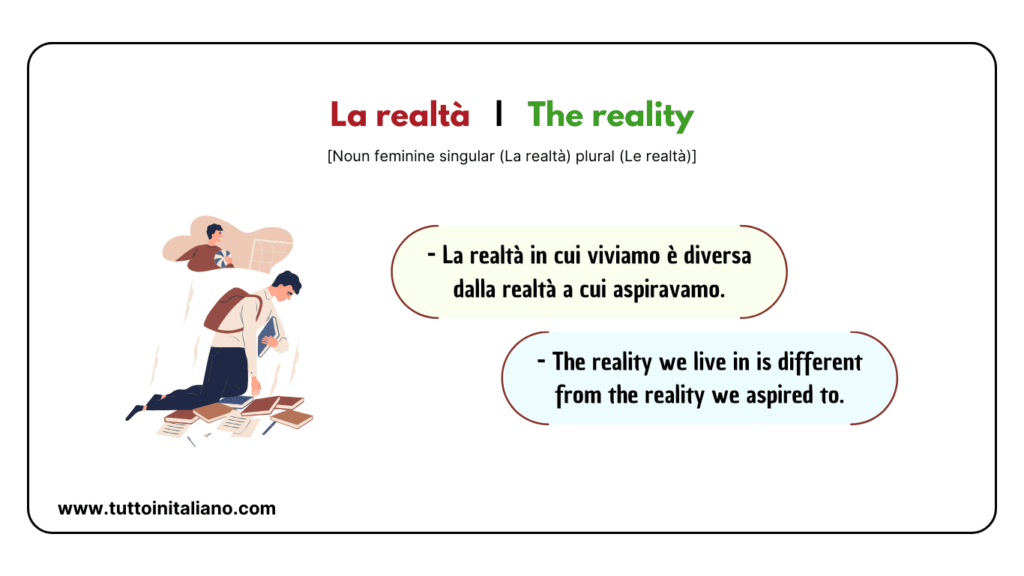
- La realtà in cui viviamo è diversa dalla realtà a cui aspiravamo.
- The reality we live in is different from the reality we aspired to.
- La realtà virtuale.
- Virtual reality.
- In realtà no/sì.
- Actually no/yes.
- In realtà non lo so.
- Actually, I don’t know.
- In realtà non mi interessa.
- I don’t actually care.
13. La Fantasia / L’illusione | The Fantasy / The Illusion
Noun Feminine singular (La Fantasia / L’illusione) plural (Le Fantasie / illusioni)
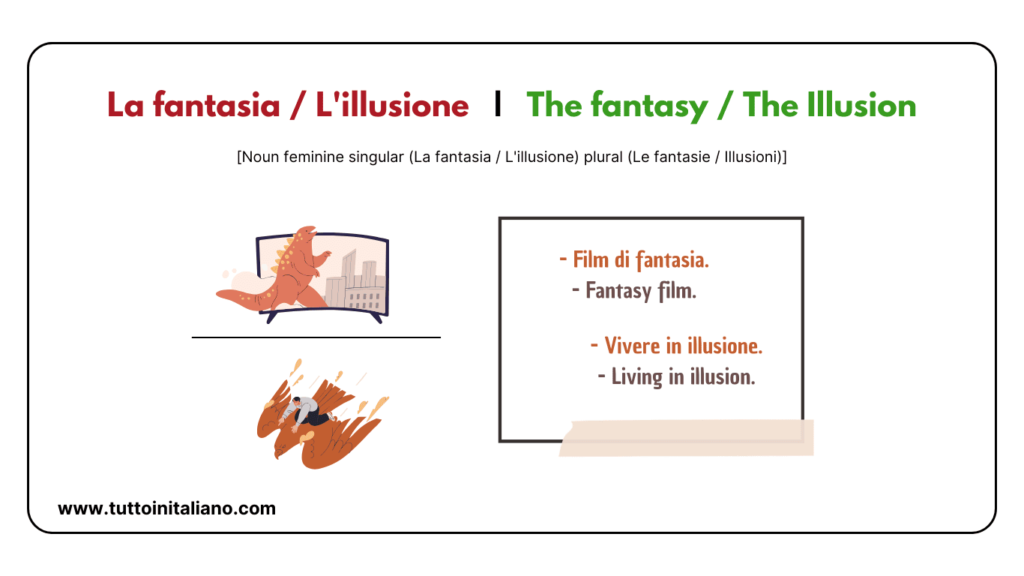
- A volte realtà e fantasia sono difficili da distinguere.
- Sometimes reality and fantasy are difficult to distinguish.
- Non farti illusioni.
- Don’t get your hopes up/Don’t have any illusions.
- Film di fantasia.
- Fantasy film.
- Vivere in illusione.
- Living in illusion.
14. La Rabbia | The Anger
Noun Feminine singular (La Rabbia) plural (Le Rabbie)
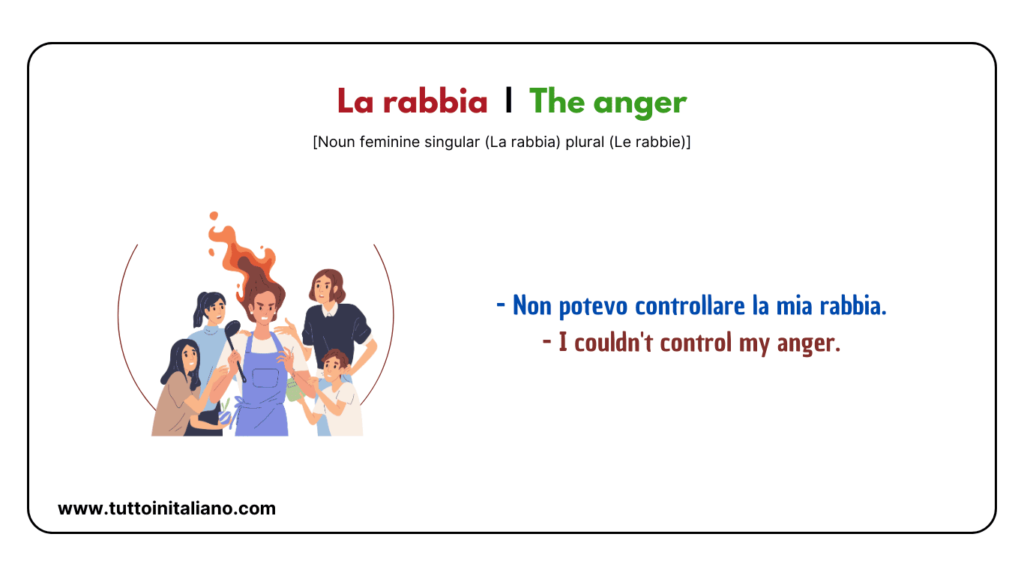
- Non potevo controllare la mia rabbia.
- I couldn’t control my anger.
- La tua rabbia mi spaventa.
- Your anger scares me.
15. La Calma | The Calm
Noun Feminine singular (La Calma) plural (Le Calme)
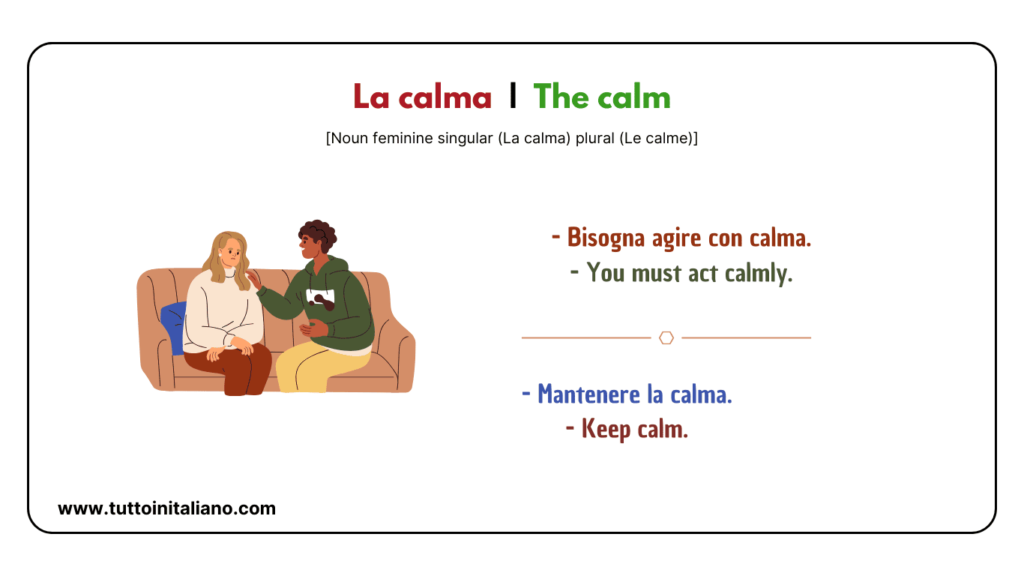
- Mantenere la calma.
- Keep calm.
- Bisogna agire con calma.
- You must act calmly.
- La calma dopo la tempesta.
- The calm after the storm.
- Non hai mai un momento di calma.
- You never have a calm moment.
Amazon Ads
16. L’Approvazione | The Approval
Noun Feminine singular (L‘approvazione) plural (Le Approvazioni)
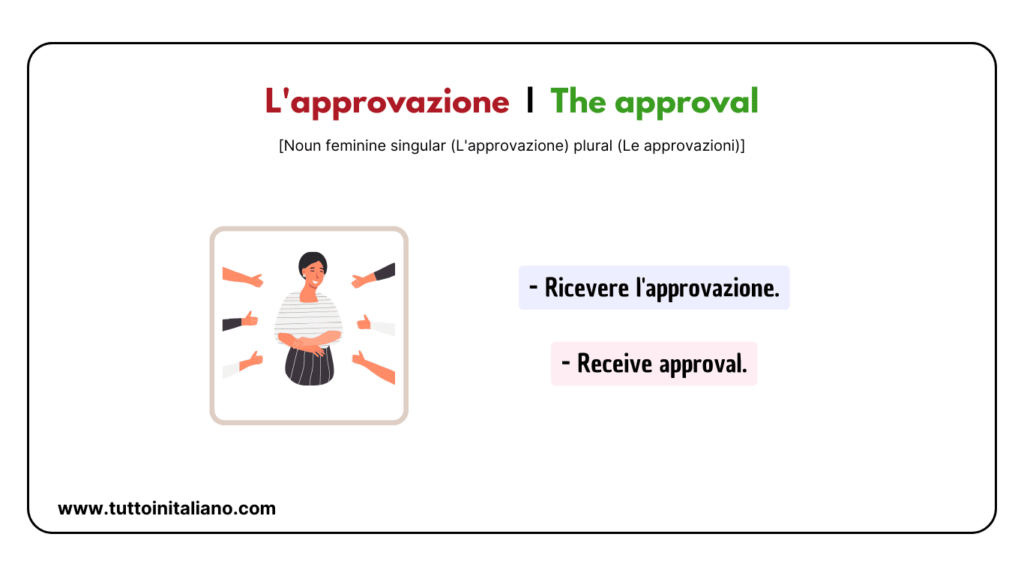
- Accennare col capo in segno di approvazione.
- Nod your head in approval.
- Dare la propria approvazione.
- Give your approval.
- Ottenere l’approvazione.
- Get approval.
- Chiedere l’approvazione.
- Ask for approval.
- Ricevere l’approvazione.
- Receive approval.
17. La Disapprovazione | The Disapproval
Noun Feminine singular (La Disapprovazione) plural (Le Disapprovazioni)
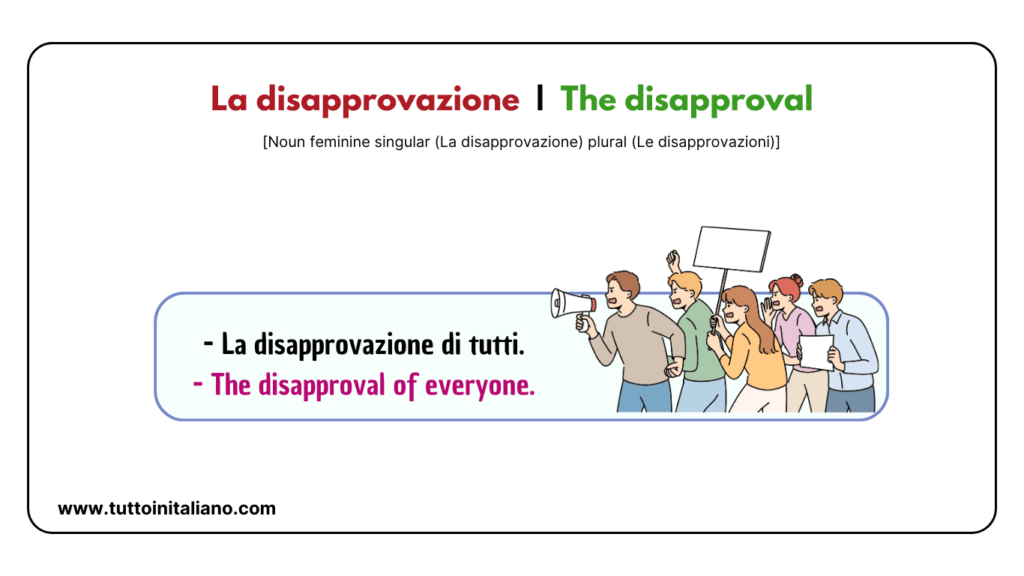
- Le mie richieste sono state accolte con disapprovazione.
- My requests were met with disapproval.
- La disapprovazione di tutti.
- The disapproval of everyone.
18. L’affermazione / L’accettazione| The Affirmation / The acceptance
Noun Feminine singular (L’affermazione/L’accettazione ) plural (Le affermazioni/accettazioni)
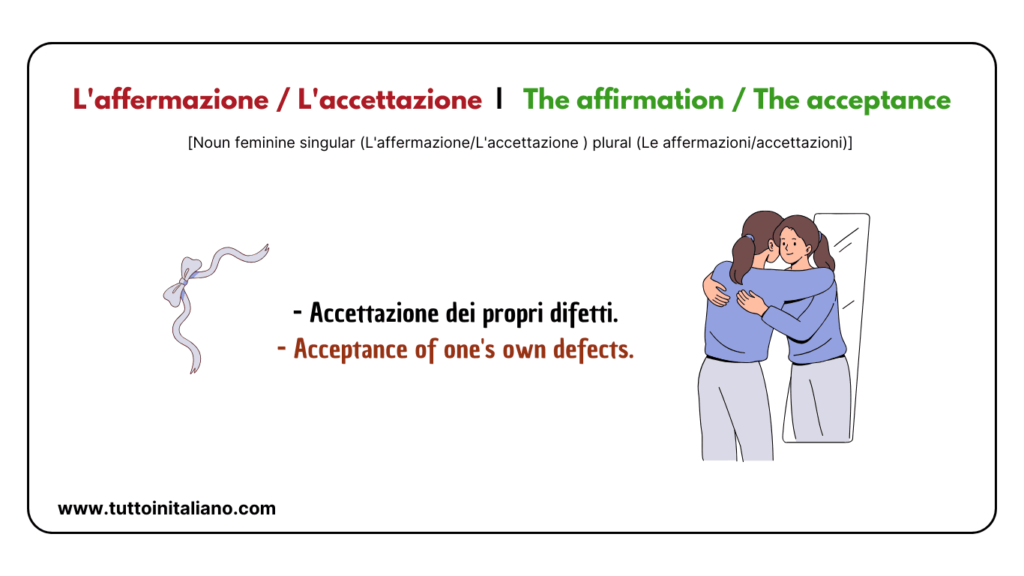
- Affermazioni positive per il mattino.
- Positive affirmations for the morning.
- ِِِِِِAccettazione dei propri difetti.
- Acceptance of one’s own defects.
- ِِِِِِAccettazione di un consiglio.
- ِِِِِِAccepting advice.
- Molte affermazioni positive per entrare in uno stato di profonda gratitudine.
- Many positive affirmations to enter a state of deep gratitude.
19. La Negazione | The Denial
Noun Feminine singular (La Negazione/La Negazione) plural (Le Negazioni/Negazioni)
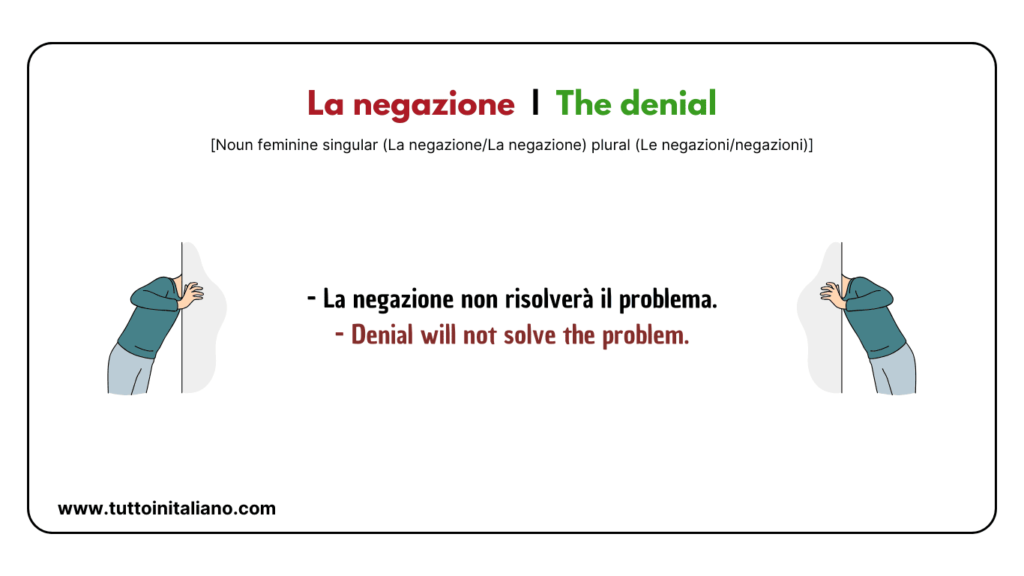
- Devi ammetterlo. La negazione non ti aiuterà.
- You have to admit it. Denial won’t help you.
- La negazione non risolverà il problema.
- Denial will not solve the problem.
20. La Solitudine | The Solitude
Noun Feminine singular (La Solitudine) plural (Le Solitudini)
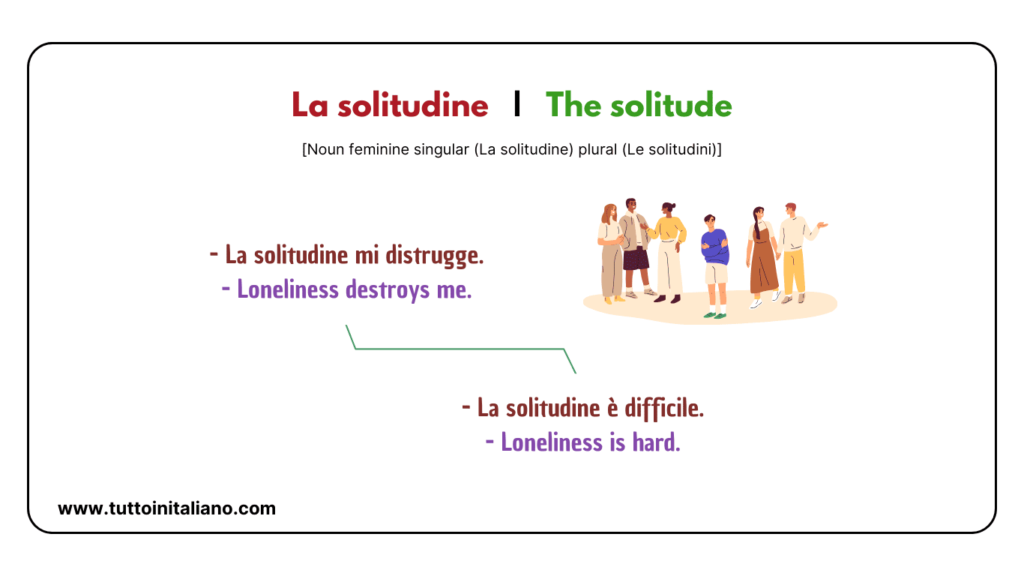
- La solitudine è difficile.
- Loneliness is hard.
- La solitudine mi distrugge.
- Loneliness destroys me.
Amazon Ads
21. La Compagnia | The Company
Noun Feminine singular (La Compagnia) plural (Le Compagnie)
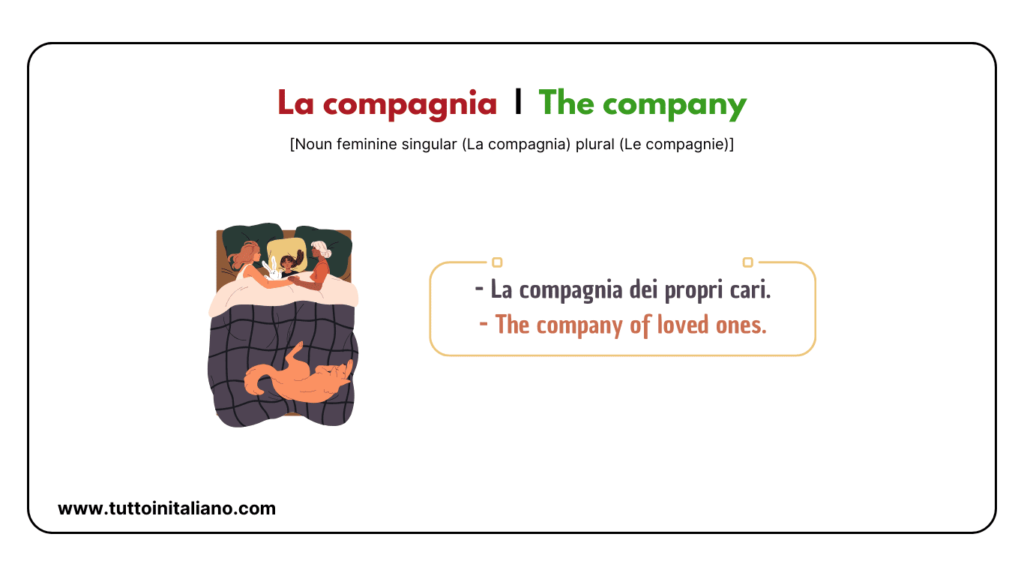
- Una buona compagnia di amici.
- A good company of friends.
- La compagnia dei propri cari.
- The company of loved ones.
Reading and listening
Concetti astratti nelle nostre vite | Abstract concepts in our lives
La lealtà è un legame potente che spesso trascende la slealtà, creando una base di fiducia e rispetto. Tuttavia, quando l’avarizia sostituisce la generosità, le relazioni possono vacillare, poiché lo spirito di donazione svanisce nelle ombre dell’egoismo. In un mondo in cui la libertà è amata, molti sono ancora legati dalla servitù, che sia alle circostanze o agli altri. La tensione tra approvazione e disapprovazione può plasmare l’autostima di una persona, lasciando alcuni alla ricerca di affermazione mentre altri si crogiolano nella negazione. La danza tra speranza e disperazione è costante, poiché la realtà spesso si scontra con le fantasie che costruiamo nella nostra mente. La rabbia può aumentare di fronte all’ingiustizia, ma la calma può essere un rifugio, soprattutto quando ci si trova di fronte alla solitudine, dove si può riflettere sul vero significato della vita e sulla forza che si cela dentro.
Loyalty is a powerful bond that often transcends disloyalty, creating a foundation of trust and respect. Yet, when stinginess replaces generosity, relationships can falter, as the giving spirit fades into the shadows of selfishness. In a world where freedom is cherished, many are still bound by servitude, whether to circumstances or to others. The tension between approval and disapproval can shape one’s self-worth, leaving some seeking affirmation while others wallow in denial. The dance between hope and despair is constant, as reality often collides with the fantasies we build in our minds. Anger may surge in the face of injustice, but calm can be a refuge, especially when faced with solitude, where one can reflect on the true meaning of life and the strength that lies within.
Exercises about abstract nouns in Italian with the answers
What is the opposite of the following words:
- La Lealtà
- La Generosità
- La Libertà
- Il Rispetto / L’apprezzamento
- La Speranza
- La Realtà
- La Rabbia
- L’approvazione
- L’affermazione / L’accettazione
- La Solitudine
The answer
- La Slealtà
- La Tirchieria / L’avarizia
- La Servitú / La Cattività
- Il Disprezzo
- La Disperazione
- La Fantasia / L’illusione
- La Calma
- La Disapprovazione
- La Negazione
- La Compagnia


